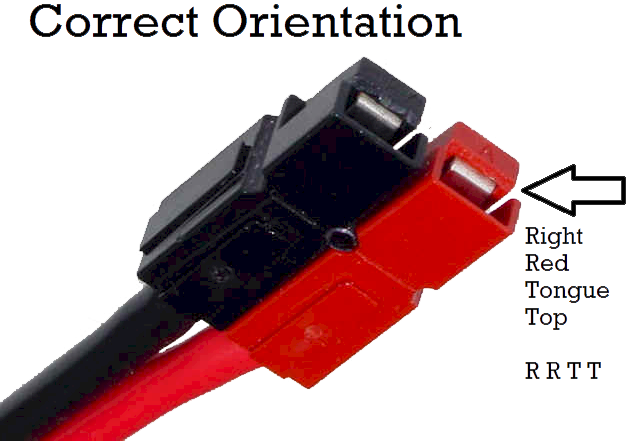|
Powerpole Connectors
State of California OES prescribes the Anderson Powerpole as the standard dc power connector for use
by State ACS/RACES personnel, and recommends its use by County and City RACES personnel as well.
County of Orange RACES and other RACES groups throughout California and the United States have now
adopted this connector. This standard, highly reliable connector allows quick and easy
installation and substitution of radios, power supplies, batteries, and other equipment.
Either the 15-ampere (PP15), 30-ampere (PP30), or 45-ampere (PP45) sizes may be used, and
any of those sizes mate with each
other. The plastic parts are the same for all three sizes. The barrel area (which holds the wire) of the
15-ampere silver-plated contact is smaller than that of the 30-ampere contact, which is smaller than
that of the 45-ampere contact, but the contact area
is the same. The connectors dovetail together into a compact unit.

RED goes to +13.8 VDC and BLACK goes to ground. Housings should
be mated according to the image above, viewing from the contact side (opposite
the wire side), hood down, RED on the RIGHT, and TONGUE on the TOP ("RRTT"). Use a 3/32-inch-diameter
roll pin, 1/4 inch long, to keep the housings from sliding apart.
Highly conductive silver-plated copper contacts allow minimal contact resistance at high
currents. Self-wiping action on make and break keeps conducting surfaces clean. Contact dents keep
connectors mated in high-vibration applications and provide quick-break, snap action upon
disconnect.
Noncorrosive stainless-steel leaf springs maintain constant contact pressure—ideal for frequent
connections/disconnections and intermittent overloading. Durable, high impact-resistant,
polycarbonate housing with UL94V-2 flammability ratings comes in many colors for circuit
traceability and coding.
Identical connector halves are genderless—making assembly quick and easy and reducing the
number of parts stocked. Molded-in dovetails allow for a customized harness in a variety of
configurations. When the connectors are disconnected, no metal parts are exposed.
The 15-ampere contacts are designed for 16-20 AWG wire, the 30-ampere contacts are designed
for 12-16 AWG wire, and the 45-ampere contacts are designed for 10-14 AWG wire. The contacts can be soldered or crimped to wires. An expensive crimping tool
(#1367G1) is available from Anderson. Other, less expensive, crimping tools are available from
other sources. After a contact has been attached to a wire, it should be installed
into the housing so that the housing spring mates with the underside of the contact.
To remove a contact from the housing, use Anderson insertion/extraction tool #111038G2. You may
also substitute a very small blade (jeweler's screwdriver or X-acto knife) to depress the spring,
allowing the contact to be removed.
Here are the Anderson part numbers:
|
15 A
Black
Red
|
Complete Connector
1395G1
1395
|
Housing Only
1327G6
1327
|
Contact Only
1332
1332
|
|
30 A
Black
Red
|
Complete Connector
1330G4
1330
|
Housing Only
1327G6
1327
|
Contact Only
1331
1331
|
|
45 A
Black
Red
|
Complete Connector
1345G6
1345
|
Housing Only
1327G6
1327
|
Contact Only
261G2-LPBK
261G2-LPBK
|
The connectors can be panel mounted with clamp receptacles, consisting of two aluminum plates
(Anderson part #1462G1), notched to hold the plastic housings when they are dovetailed together.
The plastic housings come in other colors also. Red and black are suggested for standard dc
connectors (red as positive and black as negative).
Anderson Power Products Web Site:
https://www.andersonpower.com/us/en.html.
|